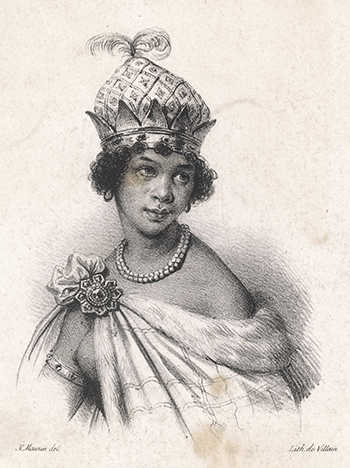| Queen Nzinga | c.1581-1663 | Modern-day Angola | State Leadership |
 Drawing of Queen Nzinga
In the late sixteenth and early seventeenth centuries, city states along the Central African coast began to be of interest to Portuguese Atlantic slave traders who established a fort and settlement at Luanda (in present-day Angola) in 1617. African rulers were faced with a dilemma; submission meant sacrificing nominal independence whereas resistance risked losing established trading relations and potential advantage over rival African neighbours. One leader who handled this dilemma shrewdly was Queen Nzinga.
Drawing of Queen Nzinga
In the late sixteenth and early seventeenth centuries, city states along the Central African coast began to be of interest to Portuguese Atlantic slave traders who established a fort and settlement at Luanda (in present-day Angola) in 1617. African rulers were faced with a dilemma; submission meant sacrificing nominal independence whereas resistance risked losing established trading relations and potential advantage over rival African neighbours. One leader who handled this dilemma shrewdly was Queen Nzinga.
Born into the royal family of Ndongo in central West Africa, Nzinga became Queen of the Mbundu people in in 1626, having served both as her brother’s envoy and as regent following his death. Initially, Nzinga made accommodation with the Portuguese. In so-doing she gained an ally in the struggle against her African enemies and, at the same time, called a halt to Portuguese slave raids in her own kingdom. She converted to Christianity, adopting the name Dona Anna de Souza.
However, the treaty was short-lived and Nzinga escaped with her people further west, where they founded a new state at Matamba. In alliance with former rival states Nzinga led an army against the Portuguese, initiating a thirty year war. She achieved victory in 1647, aided by the Dutch, and encouraged rebellion within Ndongo, which was now governed through a puppet ruler. When the Dutch in turn suffered defeat at Portuguese hands and withdrew from Central Africa, Nzinga continued her struggle, leading her own troops into battle. She developed Matamba as a trading power by capitalizing on its strategic position as the gateway to the Central African interior.
Despite numerous attempts by the Portuguese and their allies to capture or kill Queen Nzinga, she died peacefully in her eighties, by which time Matamba had become a strong commercial state.
 This article is part of the world-changing women collection. All the articles in this collection are specially produced for the How women changed the world interactive tour created to reveal the untold stories the history books left out.
This article is part of the world-changing women collection. All the articles in this collection are specially produced for the How women changed the world interactive tour created to reveal the untold stories the history books left out.
You can also view these articles without the interactive feature here.


Rate and Review
Rate this article
Review this article
Log into OpenLearn to leave reviews and join in the conversation.
Article reviews